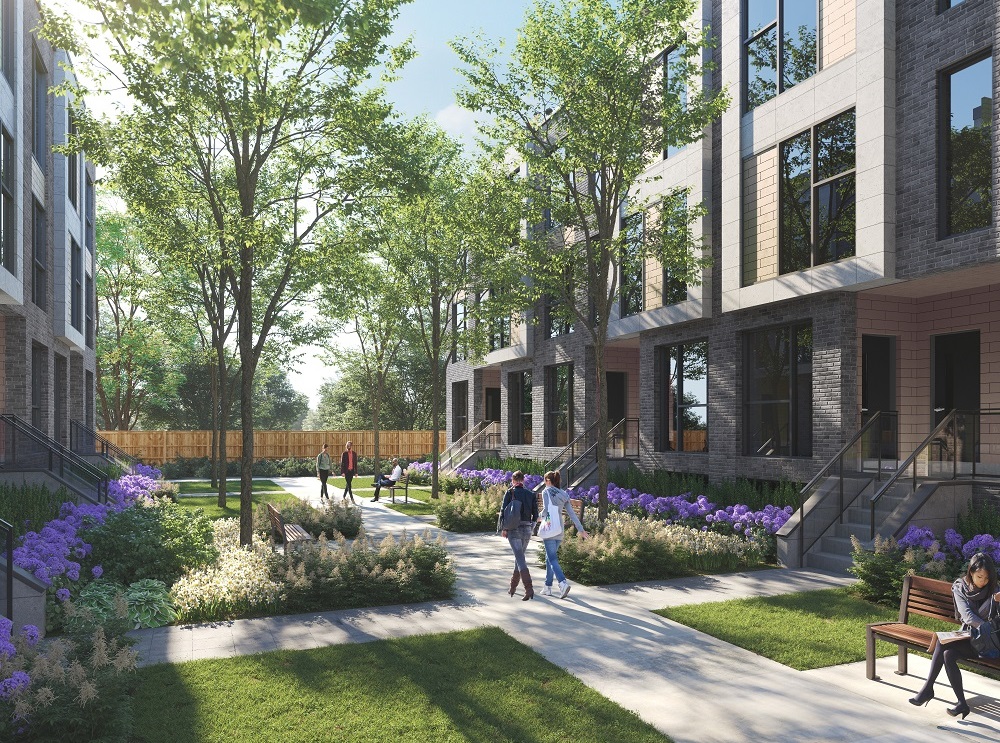Gentle density comes to Scarborough by the lake

For years, Scarborough’s Birch Cliff has been touted as one of the city’s next up-and-coming neighbourhoods; even former Toronto chief city planner Jennifer Keesmat and real estate developer Brad Lamb have singled it out as a good place to invest. Part of the appeal is that the area is close to transit — the Danforth GO and Victoria Park TTC stations are nearby. It’s also surrounded by natural beauty — it sits at the edge of Lake Ontario — and there’s a lively commercial strip on Kingston Road, dotted with restaurants and cafés.
Bryan Nykoliation, the president of Core Development Group, is betting that Birch Cliff, stretching over the western Scarborough Bluffs, will deliver on that long-promised potential. Core owns three parcels of land near Kingston Road, with plans underway to build almost 370 condos and townhomes in the early 2020s.
“I’m well invested in Birch Cliff,” says Nykoliation, who has personal attachments to the community: his family lives in Fallingbrook, in Birch Cliff’s westernmost pocket.
Nykoliation’s support is taking the form of a currently scarce housing type. Core’s largest site, a one-hectare plot at the corner of Clonmore Road and Warden Avenue, is being developed into 118 stacked townhomes, called Clonmore Urban Towns, with expected completion in April 2020.
Nykoliation hopes the complex will provide young families with the opportunity to buy into Birch Cliff, where detached homes easily cost $1 million, increasing in price the closer they are to the lake. Clonmore’s units are three to four bedrooms, starting at $749,9000 for 1,000 square feet.
“To date, the project is 50-to-55-per-cent sold,” he says, adding that the other big demographic buying in is downsizers.
“Downsizers still want space,” he says, but not the hassle of shoveling a driveway. That isn’t an issue at Clonmore: none of the units have private drives. All parking is underground. “Each unit has at least one space,” Nykoliation explains. They are located in a garage accessed by a road that will wind between the complex’s seven clusters of townhomes. An elevator will bring residents back to grade.
Eliminating driveways is a space-saving technique that allows for more apartments on the property. It also sets Clonmore apart aesthetically in a neighbourhood where private driveways are ubiquitous.
There are other differentiating features, too. Envisioned by Toronto firm RAW Design, the project’s flat roofs, giant windows and black brick-and-concrete cladding have a distinct, downtown feel in this otherwise suburban setting, where the surrounding streets are dominated by mid-century bungalows and side splits, along with early-20th-century stock nearer to the lake. The Clonmore’s bright white interiors, by architecture and design studio U31, with contrasting black and woodsy accents, pick up the same modern feel as the facades.
The differences aren’t radically out of place, however. This isn’t a high-rise in the middle of a farmer’s field. Instead, it’s a gentle addition of density and urbanity to a part of the city where people want to live, and where there is space to add new dwellings. Clonmore replaces a series of single-family homes, separated by wide lots, with structures that aren’t much bigger — three storeys, as opposed to one or two – but these homes adjoin their neighbours and they’re stacked on top of one another.
“We worked very hard to ensure the design integrates well into the community,” says Nykoliation. “We did extensive community consultations, more than just the municipally required meetings.”
Nykoliation also says he hopes the project will be certified as a Tier 2 Project by the City of Toronto, meaning that it significantly exceeds municipal green building standards. Geothermal heat pumps, which use the earth’s natural heating and cooling properties to regulate the units’ temperature, are key to the strategy. “They are more sustainable,” says Nykoliation. “They are also a cost-effective heat source and will help keep condo fees lower in the long run.”
Despite living in close proximity to neighbours and without giant lawns out back, Clonmore residents will still have abundant access to what makes Birch Cliff desirable: greenery. Each ground-floor unit steps out to a garden; the upper-level units have rooftop terraces with garden planters.
Clonmore, which sits next to a conservation area, is just south of Warden Woods and the Taylor-Massey Creek, a leafy area with walking paths and an off-leash dog enclosure. It’s also a short trip from the Scarborough Bluffs and Toronto’s eastern Beaches.
“There’s no amenities building on the property,” says Nykoliation. “Freehold, stacked towns don’t require amenities, the way a condo building might. Instead, there’s access to many trail linkages and outdoor spaces.”
Now the question is how many beleaguered, tree-deprived downtowners are willing to swap their party rooms for a walk to the cliffs.
Pricing: $749,900 to $1,119,000. For more information, visit Clonmoretowns.ca or the sales office at 1488 Kingston Rd.
Three things
Downtown doesn’t have a monopoly on artisanal coffee. The Birchcliff offers small-batch beans (from Brothers’, in Oakville), craft brews (flat whites, lattes) and fresh croissants. 1666 Kingston Rd.
For a long time, Birch Cliff was known for its Irish ancestry, with over 30 per cent of locals claiming roots in the Emerald Isle. Jatujak signifies a diversifying demographic, offering authentic Bangkok street food such as khao soi and pad see ew. 1466 Kingston Rd.
Among Toronto’s private golf clubs, the Toronto Hunt is not only one of the oldest – it opened in 1843 – but might have the most beautiful location, with links looking out to the tree-lined shores of Lake Ontario. 1355 Kingston Rd.